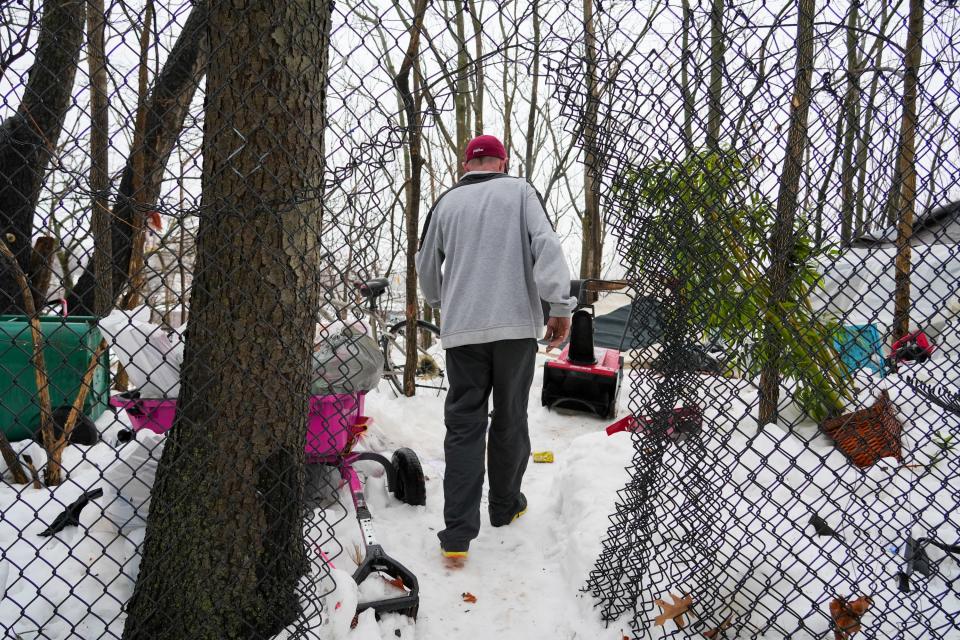Lena Saunders was caught off guard when Des Moines city workers came to clean up her campsite along the Des Moines River last winter.
A crew came with a bulldozer, leaving her and three friends, who were all homeless, scrambling to pack their belongings.
Saunders said the city put up notices instructing them to leave the area, but an appeal from mutual aid workers on top of heavy snowfall paused the plans. That made it harder for Saunders and her friends to know when workers would eventually return.
Advertisement
Advertisement
The day they came, Saunders took what she could carry: shoes, clothes and some keepsakes.
“We had to leave our tent behind,” she told the Des Moines Register during an interview in mid-January at Central Library in downtown Des Moines. Saunders was among more than a dozen people at the library’s weekly outreach program where service providers offer help with benefits, free vaccines and other resources.

Lena Saunders poses for a portrait at Central Library on Friday, Feb. 7, 2025, in Des Moines.
Living outside has taught the 31-year-old Adel native not to get too attached even to her most precious possessions. Saunders said she now keeps everything she needs to survive on her back, but the added weight of a new camping ban and ordinance change has become unbearable.
For months, Saunders and many others said they were unclear when the city would enforce a new law barring them from sleeping in public places and were confused over rules on storing their belongings if they’re kicked out. They said they were living in fear, wondering whether the city would come and take their homes without warning.
Advertisement
Advertisement
They say despite the city’s plan to store their belongings and reassurances about advanced clean-up notices, they’re skeptical about the process — especially how to get their items back — and fear what little possessions they do have will get lost.
Des Moines City Council voted on the changes in September to combat rising homelessness. Last January, Polk County found approximately 715 homeless people — 147 of who were unsheltered — on a single night during a bi-annual point-in-time count.
The ban imposes a $15 fine for individuals caught sleeping and camping in public places and reduces the amount of time for people to remove their belongings to three days from 10.

Volunteers Manny Ordaz, left, and Clayton Bunch provide a welfare check at a homeless camp in Des Moines on Saturday, Dec. 24, 2022, as temperatures hung out around 0 degrees.
City officials said the controversial ban was a tougher approach on homelessness and believe it will encourage people to use local shelters and housing resources.
Advertisement
Advertisement
It officially took effect Feb. 10.
Council also came up with directives to help reduce barriers for people entering emergency shelters, including providing storage for people’s personal items, which they can pick up by calling the city, and eight days of care at the Animal Rescue League of Iowa for pets. City officials previously told the Register they would not enforce the ordinance until the list was complete.
In an emailed statement, City Manager Scott Sanders said the city is “committed to following due process” and treating people experiencing homelessness with dignity while “being clear” about “what to expect.” That includes expanded outreach efforts and ensuring advance camp clean-out notices have information about an appeals process.
“We want to be a city that is compassionate to all people,” Sanders said. “We want to be a community that provides help and creates safer solutions for all people including those experiencing unsheltered homelessness in Des Moines.”
Losing belongings ‘is part of the game’ of living unsheltered
Saunders has lost track of how many times she has built and taken down her tent, or slept with her belongings, in the year she has lived outside.
Advertisement
Advertisement
“I couldn’t even tell you where I’ve lived and where I’ve slept. It’s just a blur at this point. Every single day, I would wake up and figure it out,” she said.
City staff posted signs where Saunders was camping on Dec. 4, 2023, after receiving a complaint about litter and open burning, according to a timeline shared by Des Moines. But public works crews didn’t clean up the site until Feb. 7, 2024, following an administrative hearing in January, and pauses due to cold weather and the point-in-time count.
When the city came that cold February morning last year, she and her friends hid some of their belongings. That included Saunders’ snow globe that belonged to her late mother and dog toys — things she says she has since found.
Saunders says she has found pieces of her favorite books and jewelry scattered throughout Des Moines.
Advertisement
Advertisement
“It’s sad,” she said. “You walk into the Salvation Army and you see all your clothes. Or, I’ve found things at St. Vincent de Paul. I’ve found things in dumpsters that are mine. It’s crazy.
“Sometimes, I’m like, ‘Dude, I swear to god like I am living in the Twilight Zone or something.'”

Jeffere Craddock poses for a photo with his dog Molly during an interview on Wednesday, Jan. 29, 2025, in Des Moines.
Some things Saunders has never seen again. A quilt gifted to her by her best friend’s grandmother. An Old Navy sweatshirt, one of few things left from her mother. A stuffed animal elephant she named Rufus. Her Chevy Suburban, where she lived in the days after getting evicted from her apartment.
Surviving loss is too familiar to Darnell Johnson, 56, and Tim Bouchard, 40.
Advertisement
Advertisement
Johnson said he walked away with two bags after clearing his encampment on the south side last November. His life pared down to bare bones, Johnson left behind his bicycle and walked to a friend’s encampment.
“I knew what I got myself into when I stayed out there. It’s part of the game. Just try to recover from it and move on,” he said. “That’s all we can do because (the city) will keep coming, taking our stuff.”
Meanwhile, Bouchard estimates losing “hundreds of dollars worth” of tents to cleanups or theft. Recently, he lost a Coleman lantern.
“When they bulldoze, I mean, that’s horrible,” said Bouchard who has been homeless for eight years.
Advertisement
Advertisement
More: ‘Not going to solve it overnight’: Homeless providers already strapped before camping ban
“If you’re on somebody’s property you should probably find somewhere else to go, however, them coming and bulldozing people’s stuff up into a dirt pile,” he continued, “they might as well just wait (until) they’re sleeping and do it to their bodies.”
An off-and-on cold weather moratorium since Thanksgiving paused camp cleanups until at least the week of Feb. 3, according to the city’s response to a records request. No citations had been issued under the new ordinances as of Feb. 6, officials said in a news release providing updates on homeless initiatives met to the “satisfaction” of Sanders.

A man walks back to his tent after taking a survey as part of the point in time (PIT) count of individuals facing homelessness on Thursday, Jan. 25, 2024, in Des Moines.
Advertisement
Advertisement
City officials declined interview requests from the Register to discuss the process for encampment cleanups and storage for people moving into shelters. They instead provided a statement and updates to 10 initiatives, including the storage process, and responded to additional Register questions via email.
Once cleanup notices are posted, Neighborhood Services staff plan to inform people living in encampments where and what they can store at the Municipal Services Center 2, said Assistant City Manager Malcolm Hankins. Staff will provide individuals a sticker to mark items they want held at the public works facility at 1700 Maury St. in Des Moines.
“Items must be ready for transport, reasonably clean and packed,” he wrote. “Food products, soiled materials, furniture, cooking fuel, and medication are unable to be stored.”
Additional stickers are available upon request, Hankins added. Items are kept in storage for at least 30 days and organized by camp location and storage tote number. The city does not log each individual item placed into storage containers.
Advertisement
Advertisement
People must call and make an appointment with city staff to retrieve their items. Appointments can be arranged from 8 a.m. to 5 p.m. Monday through Friday. Primary Health Care (PHC) outreach workers may be able to provide transportation to the building during hours of operation.
A records request filed to the city, revealed that between Sept. 15 and Jan. 17, one person has had their belongings — empty backpacks and bags — at the municipal center. City staff were working with outreach workers from PHC to help return them to the individual, officials said.

Sheri Watters speaks during an interview on Wednesday, Jan. 29, 2025, in Des Moines.
Des Moines starts enforcing ban after weather moratorium, expanding outreach
Susan Romine timed out of Central Iowa Shelter & Services (CISS) in December before she was able to secure her next housing. Last month’s bitter-cold temperatures brought Romine back to CISS, which offers overnight stays to adult men and women under the city’s weather amnesty program, when temperatures are 10 degrees or below.
Now, she says she has been sleeping outside while trying to figure out her next steps.
Because of the ban, Romine knows she cannot stay in the skywalks or alleyways but risks it anyway because she has nowhere else to go. She said building security officers have warned her to move, even threatened her with a citation, “and I asked them specifically: ‘Where exactly do you think I’m supposed to go?’ I mean, come on.”
She and other unsheltered individuals say they feel the city’s new rules are telling: They are unwanted.

A notice to evict is tacked to a tree near a homeless camp in Des Moines on Saturday, Dec. 24, 2022.
John Heinz, who has spent the last decade homeless and mostly living outside, said the ban and ordinance forces people who have nowhere else to go to risk breaking the rules or even jail time just for sleep, warmth or rest.
“We feel that they’re trying to run us out of town. Getting rid of us is — that’s not going to work. People come home to this every day,” Heinz, 51, said while standing next to his home made of wood and other materials that he shares with a few friends.
“Ignoring the problem and making us feel more unwanted than we already are, it’s not helping anything,” he continued. “Most of the general sense is we just want to be left alone.”
The new ordinance gives people found camping in a public space 24 hours to clean it once the city’s Neighborhood Services staff posts a notice. If city workers find campsites and belongings, they will give campers a three-day notice to clear their stuff.
When cleaning a campsite, city officials will throw away items that have “no apparent utility or monetary value” and “unsanitary” items, the ordinance states. It also said the city can confiscate weapons, drugs and items “appearing” to be stolen.
With an expanded outreach team in place, the city is tapping service providers to connect with campers before it comes to clean their sites. According to PHC, reports of encampments are sent daily from the city’s Neighborhood Services Department to Homeward, Polk County’s homelessness planning organization. The agency then shares that information with PHC, an entry point to homeless services.
The city logged 52 encroachment cases in various locations between Sept. 15 and Jan. 17, according to records obtained by the Register. Most cases were marked as “resolved,” which means they were brought into compliance, according to Neighborhood Services officials. Six cases, including a few spots in the city’s downtown core, were marked “in progress,” meaning city staff were working on the case.
PHC Program Director Shelby Ridley said outreach workers will be looking more into why people may be dodging shelter or find it challenging to transition into housing programs. Information they collect will be shared with the city, Ridley said. Outreach workers will try to connect with individuals at least twice to connect them with shelter and services, Hankins said.

Teresa Schott’s dog Lady watches as she speaks during an interview on Wednesday, Jan. 29, 2025, in Des Moines.
Officials hope working with the Animal Rescue League can eliminate at least one barrier preventing people like Teresa Schott from using emergency shelters.
Finding an emergency shelter for single women in Des Moines is hard enough let alone finding a place that will also accept her dog, Lady, she says.
“She’s my emotional support. Not a lot of places accept that as a service dog,” said Schott, 39. “She is my best friend. She’s been with me through a lot of things out there.
“When I couldn’t help myself, she helped me.”
Pets will be held temporarily at the league for up to eight days, and people reuniting with them will not be charged fees for their release, Hankins said.
PHC: Outreach expansion is needed, but more housing is key
So far, PHC has three employees on its outreach team working five days a week. Once a fourth person starts in March, the team will expand to six days a week.
Among the team’s priorities is to dig into why people are or are not going to shelters. Understanding those reasons will shed light on where some barriers lie, Ridley said.

Jeffere Craddock’s dog Molly watches him during an interview on Wednesday, Jan. 29, 2025, in Des Moines.
Growing PHC’s outreach efforts has been a long time coming, Ridley told the Register. The team, she says, is well-suited for the work and added responsibilities ahead.
To truly solve homelessness, Ridley says the city and Polk County must address the need for housing options, increasing services from rapid-rehousing to permanent supporting housing.
City officials have proposed building a designated village with 43 shelters for temporary living. The shelters manufactured by Washington-based company Pallet are box-like structures made of fiberglass. They are secured to the ground but movable.
Last month, the city submitted an application to the Iowa Economic Development Authority seeking $2 million in federal grant funding to cover the shelters’ building costs.
The Pallet project pegged for 2501 Maury St., south of East Martin Luther King Jr. Parkway “will require partners to move forward” to assist with services and funding annual operations, Hankins said.
The city continues to explore potential partnerships.
“We know that more permanent housing paired with supportive services is needed to address homelessness in our community and we’re always looking for opportunities to continue building this resource in our community,” Sanders said.

A “micro community” of Pallet shelters in Denver, Colorado.
Saunders, who has returned to camp near the Des Moines River, says she does not stick around in one place for very long, bringing only her essentials — a journal, a change of clothes, hygiene products and first aid kit.
But shuffling from place to place in the winter is also no way to live especially if it means moving further away from resources mostly housed in Des Moines’ downtown.
The constant cleanups and new ban, she says, send a clear message: “They are just dead set on getting the homeless out of the city.”
F. Amanda Tugade covers social justice issues for the Des Moines Register. Email her at ftugade@dmreg.com or follow her on X at @writefelissa.
Virginia Barreda is the Des Moines city government reporter for the Register. She can be reached at vbarreda@dmreg.com. Follow her on X at @vbarreda2.
This article originally appeared on Des Moines Register: Des Moines’ homeless fear what they’ll lose as camping ban begins
EMEA Tribune is not involved in this news article, it is taken from our partners and or from the News Agencies. Copyright and Credit go to the News Agencies, email news@emeatribune.com Follow our WhatsApp verified Channel




